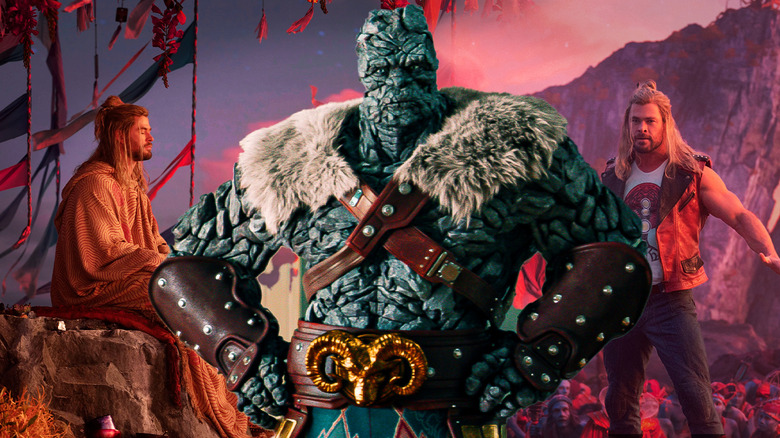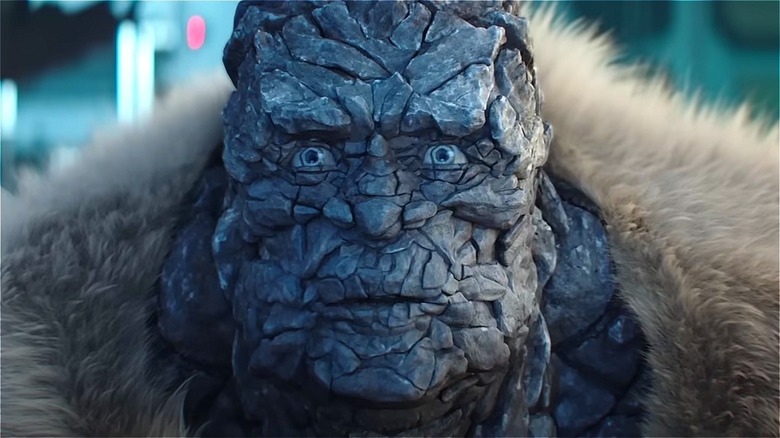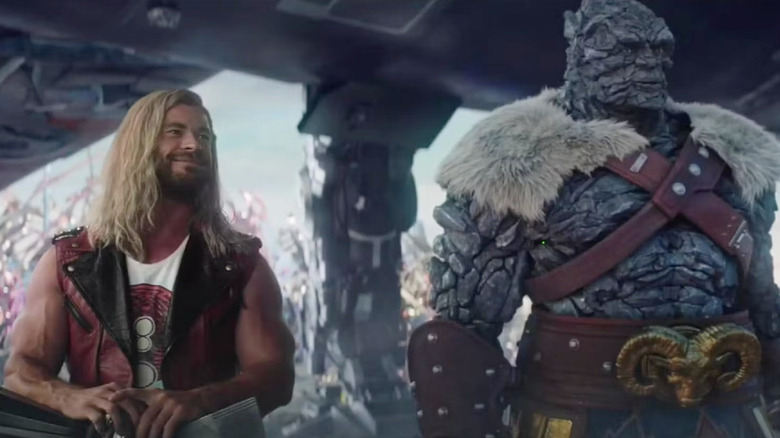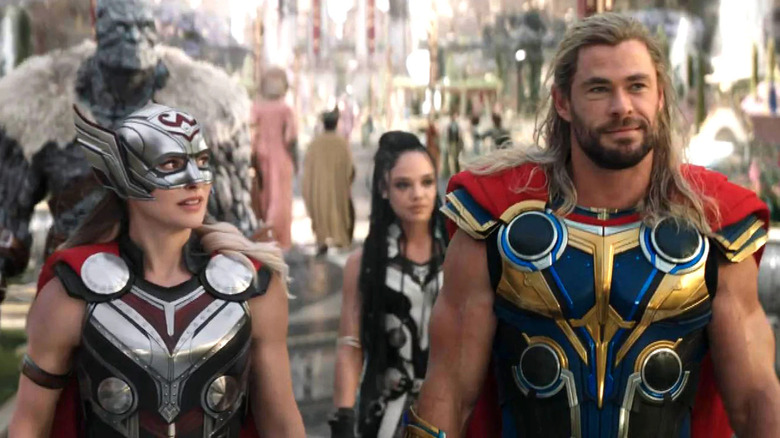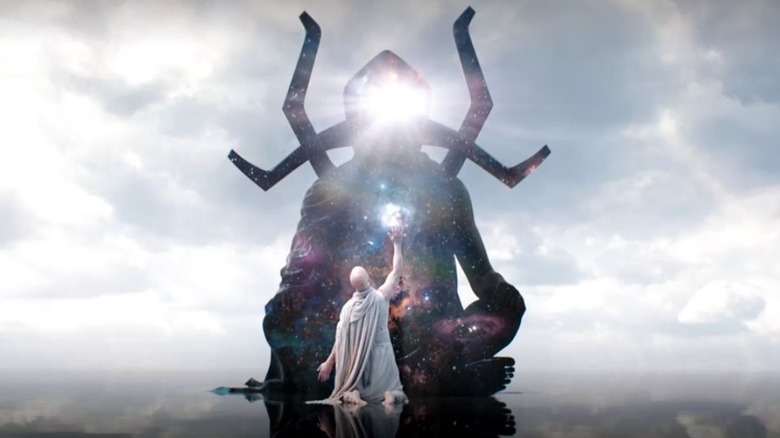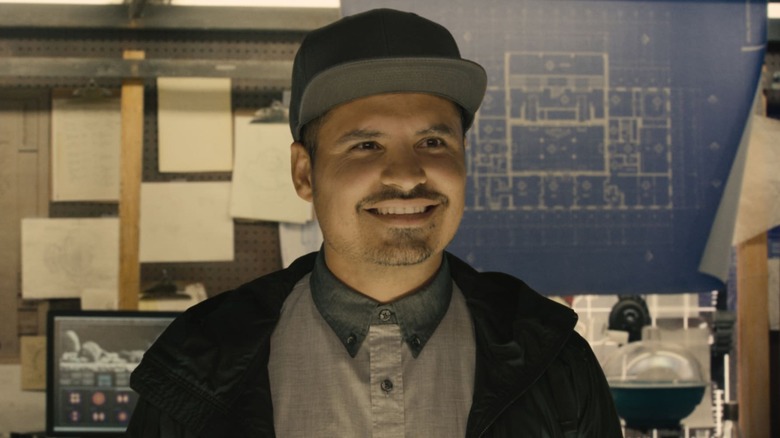Thor: Love And Thunder Is Actually Worse When You Watch It From Korg's Perspective
Taika Waititi's latest MCU "Thor" tries to Thor more than any movie has Thorred before. Yet, unlike its predecessor, it falls flat on the floor. Per its Tomatometer score, the film's tug-of-war between Gorr and Thor doesn't add much to the lore, and while it's not enough of a bore to cause an uproar, watching it can be a chore. Therefore, Waititi might be shown the door instead of scoring an encore.
Semi-rhyming rants aside, "Thor: Love and Thunder" kind of sucks, yeah? Rotten Tomatoes critics legitimately consider it the second-worst MCU movie ever made (sorry, "Eternals," you're still the pits), ranking it below turduckens like "The Incredible Hulk" and "Thor: The Dark World." And losing to "The Dark World" is more than enough to warrant a long, hard look in the mirror, especially since "Thor: Ragnarok" sits solidly among the MCU's top five critical darlings. It's all very strange, because regardless of how you feel about Waititi's signature style, he's objectively not bad at his craft, and has the Oscar to prove it. Knowing this, it's easy to wonder what happened to make "Love and Thunder" ... well, that.
Surely, we've misunderstood something here. Maybe the movie is not meant to be watched like an ordinary film. It starts and ends with Korg (Waititi) telling a story to a bunch of kids, right? Maybe that's the key to making "Love and Thunder" great — we just need to rewatch it as a story that's told entirely from Korg's viewpoint. That seems to make sense.
Yeah ... nah. Turns out, watching "Thor: Love and Thunder" from Korg's perspective actually manages to make the movie even worse. Here's how.
Thor 4's overemphasis on comedy now falls squarely on Korg's shoulders
The main problem with "Love and Thunder" is that it leans way too heavily into comedy. This disrupts its balance, and devolves much of the film into a loosely-connected series of big-budget sketches, leaving it unable to gather enough gravitas for the few genuinely impactful moments.
Here, you can witness Academy Award-winning actor Russell Crowe prance around like a second-year drama student on a Monty Python binge. If you've ever wanted to see Academy Award-winning thespian Christian Bale pour his all into an ominous, tragic performance that nevertheless keeps turning into a scrapped "I think you should leave with Tim Robinson" sketch with its randomly deployed funny voices and snark, look no further. Academy Award-winning actor (wow, there's a lot of those in this movie) Natalie Portman's and Chris Hemsworth's respective Thors are both goofy as anything, and even Jane Foster's Stage 4 cancer is the punchline of one joke. One scene shows Thor casually informing a grievously injured Sif (Jaimie Alexander), a brave warrior who's dedicated her life to serving Asgard, that she won't be going to Valhalla due to a technicality. This, too, is treated as a fun moment of levity. You get the idea, it's all like that.
These are all very good actors. Whatever's going on here is clearly not their fault. Watching "Love and Thunder" as a normal movie makes it easy to think that the film just tries to make up its lack of heart with an overabundance of humor. However, if we assume that the entire thing is a story Korg's telling, all the narrative weirdness and wackiness where wackiness isn't needed is suddenly his fault.
Korg is the exact wrong kind of narrator for any movie
Korg as a narrator character is a horrible idea. There's just no getting around it. Sure, letting a comedic character act as the Greek chorus isn't exactly a new narrative device. The House of Mouse has been particularly fond of the trope in its animated films, using characters like Aladdin's street merchant (Robin Williams), "The Hunchback of Notre Dame's" Clopin (Paul Kandel), and the muses in "Hercules" in this capacity.
That being said, not all comic relief characters are created equal. Korg works just fine in "Thor: Ragnarok," largely because he's not a massive part of it. While he has plenty of lines and a reasonable amount of screen time, he ultimately amounts to little more than a delightful creator cameo that's tactically and skillfully deployed for comic relief. This is exactly how a character that amounts to "scary rock man with a funny voice" should be used. On the other hand, putting the wacky "Piss off, ghost" character in charge of narrating a full-length movie will just give you "Piss off, ghost," the movie. Which, come to think of it, is not a bad way to describe "Thor: Love and Thunder."
Korg is already overrepresented in Love and Thunder
In "Love and Thunder," Korg is a far more prominent character than in "Ragnarok," despite the fact that his natural role in the narrative is much smaller. In "Ragnarok," he's an organic part of the plot, and leads the revolt against the Grandmaster (Jeff Goldblum). Here, he's just sort of inserted into the story, and hangs around as a pointless semi-sidekick for much of the movie. While he gets a bait-and-switch death scene that sets up another bait-and-switch death scene, and an admittedly very heartwarming sub-sub-sub-subplot about starting a family, his overall role in the movie can come across as creator overindulgence.
Waititi appearing in his own projects is par for the course, but it's one thing to take on a main role in "Jojo Rabbit," and quite another to inflate the role of a minor supporting character far beyond said character's natural limitations. If you watch the movie with the assumption that he's the primary viewpoint character and narrator on top of all that, Korg's suddenly creaking at the seams so much that it's a surprise he doesn't fall apart well before Zeus (Crowe) gives him an assist.
Korg has no way of knowing what really happens in many of the key scenes
One plot hole with Korg's perspective is the simple fact that he isn't present in several of the more important scenes. Sure, he's a social kind of person, and an important member of New Asgard's community, so he might have heard the parts he personally missed from Thor, Axl (Kieron L. Dyer), and others who were around. However, this only adds another layer of awful in "Thor: Love and Thunder."
Based on the opening of the movie, we already know that Korg is a storyteller of the "great Norse sagas" school, presenting the life and times of Thor Odinson as a highly cinematic (and probably more than a little embellished) action adventure. Assuming that he already puts his own spin on the parts of the story he was present for — such as describing a Thor nude scene in Omnipotence City to his decidedly underage audience – how much of the real story is left after he takes Thor's egoistical tales and Axl's excited stories of the final battle through his own filter?
As such, if we accept that the entire movie is told through Korg's narration, we have absolutely no idea what the real story behind the movie's events are, because the story is told by an unreliable narrator who got much of his information from other unreliable narrators. For all we know, Thor and his gang spent every off-world scene of the film playing checkers with some pale, bald dude, and Korg's been telling the story for so long that it's evolved into a high-stakes divine battle. Sure, there were injuries on the way, and Sif lost an arm at some point, but maybe it was a really intense game of checkers.
The idea of character narration just makes us miss the best storyteller in the MCU
Okay, this one's not directly on Korg or Waititi, but since we're running with the concept of comedic MCU sidekicks acting as narrators, it can't be avoided. We simply need to talk about Luis.
Michael Peña's enthusiastic ex-con is responsible for arguably the best scenes in both "Ant-Man" and "Ant-Man and the Wasp," thanks to his motor-mouthed narration style that conveys the necessary information via a wild series of seemingly disconnected sidetracks, all of which are accurately depicted on screen as he describes them. Luis' three narration scenes across the two movies come up at well under five minutes, but they're more than enough to make him the storyteller all other MCU storytellers are compared to. They also show a way to do the whole "comedic narrator" thing in a way that doesn't twist and turn the story. Though Luis' mind takes him to wine tastings, art galleries and his friends' inner turmoil before, he never twists the actual facts, and describes the events exactly as they happened — but with his take inserted in a way that's actually entertaining.
In other words, Luis is the anti-Korg. Now that we've been forced to sit through the latter's feature-length storytelling, it's only fair that the MCU gives a few scoops of the former. Here's looking at you, "Ant-Man and the Wasp: Quantumania."
